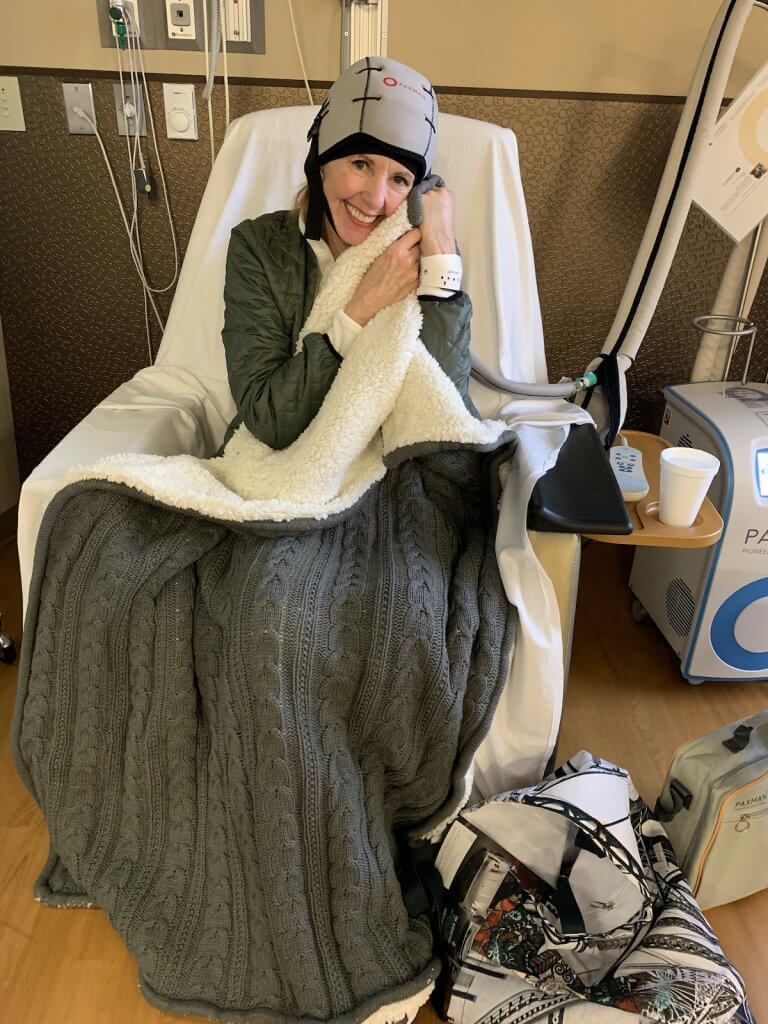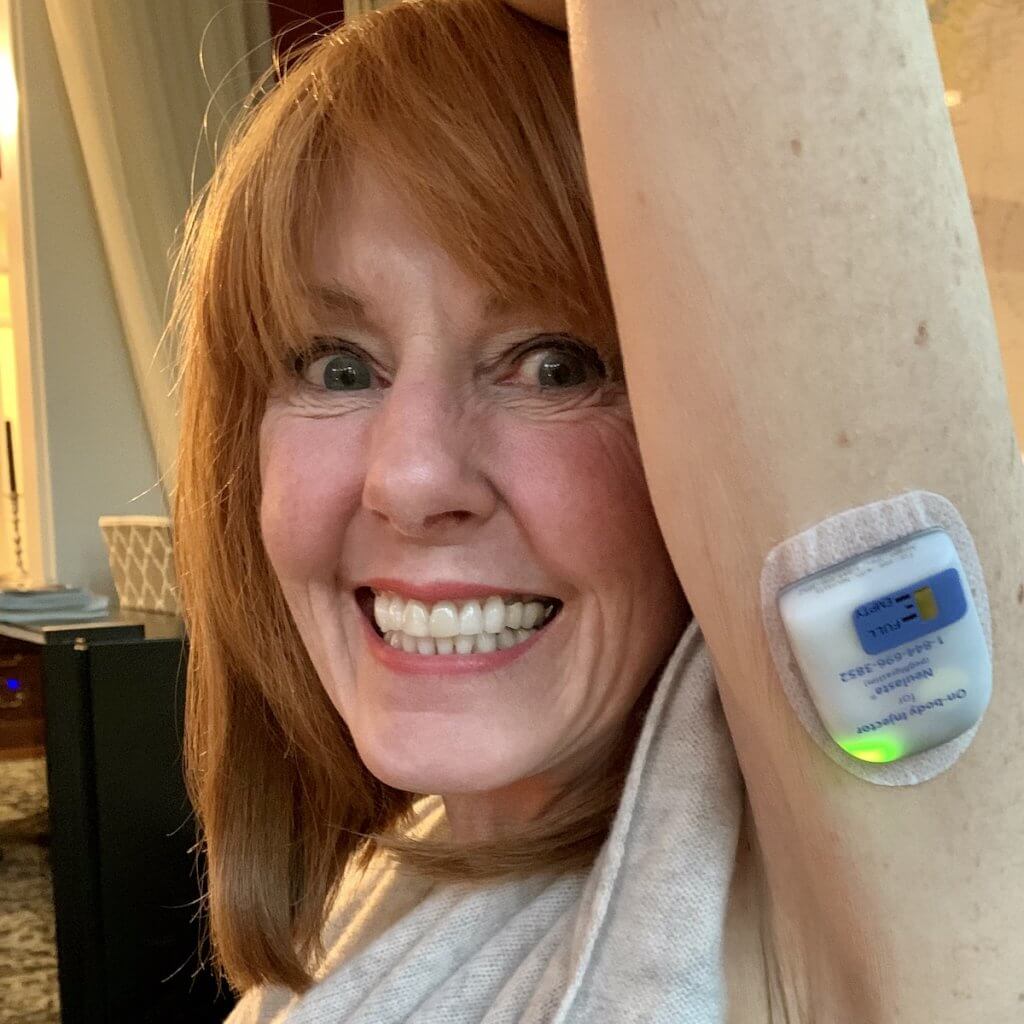Joy Albi has encountered plenty of surprises during her long career as a defense attorney, but she was still caught off-guard when her HER2-positive breast cancer diagnosis took an unexpected twist last year. The way things turned out, however, made her appreciative for the new evidence revealed in her case.
Albi, a Cincinnati resident, had traveled to Boston in early 2020 to join a clinical trial for her cancer at the Susan F. Smith Center for Women’s Cancers at Dana-Farber/Brigham and Women’s Cancer Center. There it was discovered that the actual tumor in her breast had been missed in a previous surgery. By uncovering the true extent of the cancer, study leader Sara Tolaney, MD, MPH, of the Susan F. Smith Center was able to quickly get Albi on the right treatment regimen.
“Thank goodness for that second look by Dr. Tolaney,” says Albi. “Every cancer patient has a “what if” moment, and mine is “What if I had never come to Boston and said I wanted to join that trial?”

One cancer, two diagnoses
A very fit retiree and who enjoyed volunteering with the United States Tennis Association and traveling with her husband of nearly 43 years, Frank, Albi was diligent about her breast self-examinations and considered herself “bulletproof” in terms of good health. Then her Cincinnati oncologist noticed a blueberry-sized spot on Albi’s breast during a routine mammogram in November 2019. Once a biopsy confirmed it was cancer, Albi had a lumpectomy in which the tumor was removed.
For the next stage of treatment, Jackson recommended the Albis travel to Boston for a consult at the Susan F. Smith Center, where she said there were more treatment options — including clinical trials. There the couple met with Tolaney, associate director of the Susan F. Smith Center and director of clinical trials in Breast Oncology.
“We were very impressed by Dr. Tolaney’s demeanor and expertise, and she walked us through what it was like to be on a trial,” Albi says. “I was a good candidate for one of her upcoming studies, and we went home very excited about doing something that would help me and push the science forward.”
Then, a few weeks later, Albi’s phone rang one Sunday night. It was Tolaney, explaining that after looking at Albi’s pathology slides from her Cincinnati lumpectomy, she and her Dana-Farber colleagues suspected that what had been removed from her breast was a lymph node — not a tumor. Tolaney recommended Albi get a breast MRI immediately for a more definitive answer.
Sure enough, the MRI showed a tumor. It had gone unseen in the mammogram because of dense breast tissue surrounding the tumor, a situation that normally occurs in younger patients. At Albi’s age, a doctor would not normally request an MRI because tumors tend to show up on mammograms when the tissue is less dense.
“The oversight was understandable, but now I had a ‘new’ tumor and an entirely new diagnosis,” Albi says.

Remission and acquittal
Tolaney consulted with Jackson, Albi’s Cincinnati oncologist. A second lumpectomy was performed to remove the newly-discovered tumor, and Jackson devised a year-long chemotherapy regimen for Albi’s revised diagnosis. The treatment often left Albi tired, but because it coincided with the rise of the COVID-19 pandemic much of the normal travel she did to tennis tournaments and vacation destinations was canceled.
It all got Albi thinking about another “what if” aspect of her cancer journey.
“I got my mammogram just before COVID hit, and I was asymptomatic. If it was just a month or two later, I assure you I would have postponed my mammogram altogether like millions of other women did in 2020 due to the pandemic,” she notes. Then what would my cancer have looked like?”
[Should I get screened for cancer during COVID?]
What it looks like now is nothing; Albi is in complete remission. She is enjoying time in person or on Zoom with Frank, their three grown children, and their two grandkids — who she recently hugged for the first time in a year. She’s looking forward to traveling for fun and tennis tournaments when safely able.
“We feel very fortunate that our pathologists realized that the primary breast cancer was likely not surgically excised,” says Tolaney. “Joy was able to have the tumor in her breast identified and removed, and go on to receive systemic therapy. She has a wonderful team caring for her and we are so glad she is doing well.”
Well enough to joke about the fact that her story really was like a trial which takes an unforeseen and fortuitous turn.
“Sometimes you find things that were not there at the start,” she says, and then smiles. “It was like being back in court, but this time I was the defendant rather than the attorney.”

Since the passing of Nancy Capello founder of Are you Dense their has not been a lot of published information about what steps women with dense breast should be doing to protect themselves against the silent killer . I was one if the lucky women that took additional steps to detect Brest. Cancer for women with dense breast it saved my life .